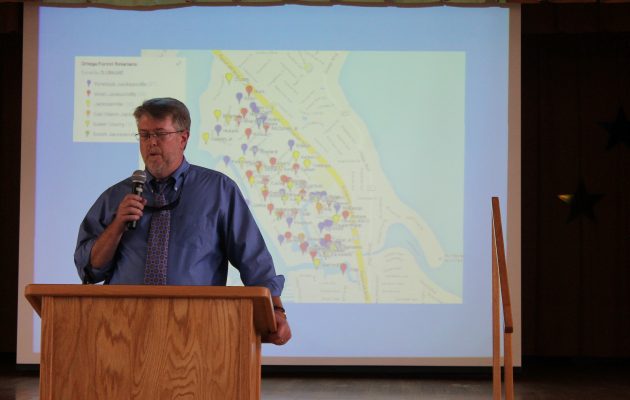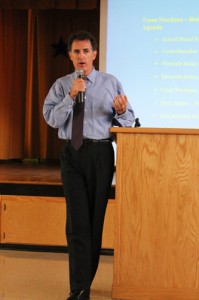Stockton School improvement project stirs unease
Posted on September 9, 2014 By Editor Articles, Neighborhood News, Top Stories

Neighbors concerned about property values
Jim Love thought he was being humorous in his opening remarks at a community meeting to review the plans for the proposed John N.C. Stockton Elementary School track and field when he stated “No good deed goes unpunished.” While the comment got more than a few laughs, the District 14 Councilman’s statement may be prophetic.
Despite nearly three years of planning and publicity, the meeting was called because a group of nearby residents felt they had not been given enough information – if any – about the changes to the existing park, including the removal of 40 trees and the addition of fencing.
“Overall, it’s a good project, and there might be some things you want to change. The Rotarians want to do what’s right and help the school. They are spending a lot of their own money to do this,” Love told an audience of 70 or more. “Bond money left over from Michael Corrigan’s term will be used for fencing around the proposed track, among other things. We want to do it right. I’m proud we have the
Rotary, who has done a lot of good projects. They are trying to do good here, too.”

Marc Sellers, president of Friends of Stockton, said the genesis of the project came about after a particularly rainy fall festival five years ago.
A private-public partnership
Working together on the public side is Duval County Public School, the City of Jacksonville, and Council District 14; on the private side, the two Rotary clubs, the Friends of Stockton, the PTA, and Greenscape.
Dan Dodd, president of Westside Rotary, and a resident of the community, said “A lot of the members live in the neighborhood and want this to be a successful project and believe it will help property values and be good for the community. We’re invested in this and will help maintain the park.”
The Riverside Rotary Club is also heavily involved in this public-private partnership. As Holt Graves, president of Riverside Rotary, explained, “Many members live in Ortega Forest and attended Stockton or their children attend the school. We’re happy to be part of this improvement to the school and the community.”
Greenscape, a 30-year-old organization whose mission is to protect, promote and plant trees, became involved two years ago at a board meeting, and committed to plant trees for the project.
Not seeing the forest for the trees
Potentially putting the entire project in jeopardy, residents along Carlisle and Long Bow roads are upset about the removal of pine trees on the school property and are not happy about the idea of a fence being erected around the perimeter of the school, including the park, which has come to be viewed as “community property.”
Although the project came about initially as a track and field improvement, other issues came to light during the discovery process, including poor drainage on the field, lack of state-required fencing for both security and safety, an open retention pond and the two portable classrooms located on the east side of the property.
The Honorable Becki Couch, chairman of Duval County Public School Board, and representative for the school said, clearly, “If there is not going to be a track, we will not incur the cost to move the portables just because they are an eyesore. DCPS is not footing the bill for a track back there. The portables would be moved only if the project goes through.”
To allay concerns about “de-forestation,” John Moscarillo, urban forester for the City of Jacksonville, explained that the majority of the trees to be removed are native Slash Pine, some exhibiting signs of Pine Bark Beetle infestation. The addition of Live Oaks to mitigate the loss of the pine trees is a positive gain, in Moscarillo’s opinion. “That’s like swapping in Yugos for Escalades,” he said. Moscarillo also noted that the trees will be placed purposefully, rather than growing “willy nilly.”
Addressing questions about who would be responsible for watering the new trees, he stated that Greenscape will be involved, as will the landscape contractor, and other groups who have a stake in the project.
Good fences make good neighbors
As regards fencing, there are three options about the type of the six-foot high fence required under state law. If it were left up to the school board, the least expensive – and least attractive – option is a galvanized chain-link fence. The Rotary clubs, with the bond money promised by Councilman Love, had proposed a black vinyl chain-link fence, which is considered to be optimal in “disappearing” from view, as noted by Bob Chabot, Ortega Forest resident and director of horticulture and facilities for the Jacksonville Zoo and Gardens.
A third option, favored by some of the residents across the streets from the school, is a style known locally as LaVilla, a wrought-iron fence used at The LaVilla School and at St. Mark’s Episcopal Day School. It is half again as expensive as the second option. Some residents like the decorative touch while others claimed it simulated the feeling of being in a compound.
Marc Sellers, president of Friends of Stockton, said “We need to keep in mind that safety for the school is paramount and although the fence is contentious, it should not be a stumbling block. It’s not often you have businesses coming together to pour money into a park. It’s a unique situation and it’s what makes Stockton such a great school.”
Who has final say?
By the end of the overly long meeting, it was clear that frustration had mounted for all parties on both sides of the tree and fence issues. One nearby resident said, “We’re concerned about our property values and don’t necessarily see this as beneficial for all concerned. We want to see the best for everyone.”
Even more strident was a complaint from another resident, “You keep telling us, ‘Trust us, you’ll love it…’ but are none of you taking seriously what we are saying or are you just humoring us? Can you blame us for being suspicious?”
Couch stated that although there was some room for compromise, she did not want to see the project fail over trees.
“We can discuss the trees and work together to come up with a better solution of shade,” said Couch. “I want to make it clear, though, this is school board property. This is the first school in my four years of being on the board where we’ve had a community meeting about improving school board property. This is not a city park.”
At the end of the day, if community disagreement remains vocal, the Duval County School Board would be well within its right to “take its ball and bat and go home.”
“If we don’t go forward with it and the Rotary decides they don’t want to stir up community and cause them to be angry, eventually you will get a chain-link aluminum fence,” Couch said as she concluded the meeting.
By Kate A. Hallock
Resident Community News




 (No Ratings Yet)
(No Ratings Yet)




